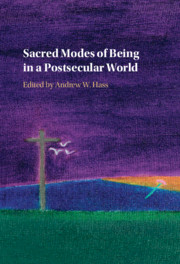Book contents
- Sacred Modes of Being in a Postsecular World
- Reviews
- Sacred Modes of Being in a Postsecular World
- Copyright page
- Contents
- Figures
- Contributors
- Acknowledgements
- Introduction
- Part I Jasper’s Sacred Mode of Being
- Part II Theology’s Cultural Mode of the Sacred
- Part III Culture’s Theological Mode of the Sacred
- Chapter 7 The Interdisciplinary Nature of Literature and Theology
- Chapter 8 William Blake as leitourgos
- Chapter 9 Bodies Dead or Alive?
- Chapter 10 The Desert Is in the Words We Speak
- Afterword
- Bibliography
- Index
Chapter 10 - The Desert Is in the Words We Speak
from Part III - Culture’s Theological Mode of the Sacred
Published online by Cambridge University Press: 07 September 2021
- Sacred Modes of Being in a Postsecular World
- Reviews
- Sacred Modes of Being in a Postsecular World
- Copyright page
- Contents
- Figures
- Contributors
- Acknowledgements
- Introduction
- Part I Jasper’s Sacred Mode of Being
- Part II Theology’s Cultural Mode of the Sacred
- Part III Culture’s Theological Mode of the Sacred
- Chapter 7 The Interdisciplinary Nature of Literature and Theology
- Chapter 8 William Blake as leitourgos
- Chapter 9 Bodies Dead or Alive?
- Chapter 10 The Desert Is in the Words We Speak
- Afterword
- Bibliography
- Index
Summary
This chapter considers the place of the desert in relation, following Nietzsche and Heidegger, to the character of human development in the modern era – “the wasteland grows; woe to him who hides wastelands within”. It looks at Heidegger’s concern with technology and language, or the way technological progress has reduced language to “idle talk”, against which the only adequate resistance, as Heidegger saw in Hölderlin, is a rebirth of the poetic. It then looks at how language interconnects with politics and science through the work of Hannah Arendt, and her distinctions between labour, work, and action in The Human Condition. Here recovering language from the colonization of science, technology and mass data begins by restoring the forms of political discourse qua speech, which in turns requires dispensing with what Uwe Poerksen calls “plastic words” that professionalize, institutionalize and modularize language. The chapter concludes these thoughts by returning to Heidegger’s question of poetry, and specifically to words by Matthew Arnold, where the desert that is in our words might become our saving power.
Information
- Type
- Chapter
- Information
- Sacred Modes of Being in a Postsecular World , pp. 205 - 222Publisher: Cambridge University PressPrint publication year: 2021
